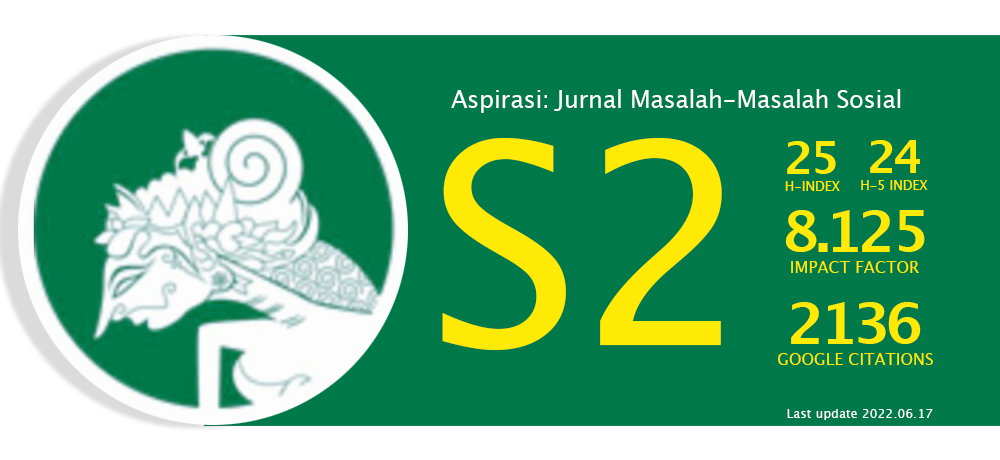Hambatan dan Strategi Bertahan Para Penyintas Covid-19: Studi Kasus Wirausaha Kuliner di Yogyakarta
Abstract
This study explores the survival strategies employed by Covid-19 survivors to improve their economic activities, with a specific focus on culinary entrepreneurs. Despite recovering from the virus, these individuals continue to face obstacles in resuming their businesses. Limited research has been conducted on the strategies adopted by survivors after their recovery, particularly in the culinary sector. This paper presents qualitative data collected through observation, document study, and interviews. The study includes twelve informants from six cases of Covid-19 transmission, purposively selected to investigate their perceptions and practices regarding economic survival post-recovery. The findings reveal that Covid-19 survivors encounter social exclusion in the form of isolation when attempting to resume work. The fear of societal stigmatization and maintaining distance from survivors results in a lack of community support, leading to economic stagnation for over a month. Despite efforts to obtain a health certificate from the government, the survivors struggle to restore normalcy. Consequently, they adopt various survival strategies, although these methods often require a considerable amount of time to achieve full recovery. To address this issue, the Indonesian House of Representatives should provide support, including oversight of government policies. It is recommended that when the government forces the closure of a business, they must also offer assistance and facilitate the official reopening after the recovery period. This approach will help restore consumer confidence and expedite economic recovery. It is crucial to learn from these findings to better prepare for similar situations in the future.
Abstrak:
Penelitian ini mengeksplorasi strategi bertahan yang digunakan oleh penyintas Covid-19 untuk meningkatkan aktivitas ekonomi mereka, dengan fokus khusus pada para pengusaha kuliner. Meskipun telah sembuh dari virus, mereka ini tetap menghadapi hambatan dalam melanjutkan usaha mereka. Penelitian mengenai strategi yang diadopsi oleh mereka setelah pulih, terutama di sektor kuliner, masih terbatas. Makalah ini menyajikan data kualitatif yang dikumpulkan melalui observasi, studi dokumen, dan wawancara. Penelitian ini melibatkan dua belas informan dari enam kasus penularan Covid-19, yang dipilih secara sengaja untuk menyelidiki persepsi dan praktik mereka terkait bertahan secara ekonomi setelah pulih. Temuan menunjukkan bahwa mereka yang selamat dari Covid-19 menghadapi eksklusi sosial dalam bentuk isolasi saat mencoba untuk kembali bekerja. Rasa takut akan stigmatisasi sosial dan menjaga jarak dari mereka yang sembuh mengakibatkan kurangnya dukungan komunitas, yang mengakibatkan stagnasi ekonomi selama lebih dari sebulan. Meskipun telah berusaha mendapatkan hasil tes negatif dari pemerintah, mereka masih kesulitan kembali ke kondisi normal. Oleh karena itu, mereka mengadopsi berbagai strategi bertahan, meskipun metode ini sering kali membutuhkan waktu yang cukup lama untuk mencapai pemulihan penuh. Untuk mengatasi masalah ini, Dewan Perwakilan Rakyat Indonesia sebaiknya memberikan dukungan, termasuk pengawasan terhadap kebijakan pemerintah. Direkomendasikan agar ketika pemerintah memaksa penutupan suatu bisnis, mereka juga harus menawarkan bantuan dan memfasilitasi pembukaan kembali resmi setelah masa pemulihan. Pendekatan ini akan membantu mengembalikan kepercayaan konsumen dan mempercepat pemulihan ekonomi. Sangat penting untuk belajar dari temuan ini agar dapat lebih siap menghadapi situasi serupa di masa depan.
Keywords
Full Text:
PDFReferences
Agmasari, S. (2021, Agustus 11). Sektor kuliner penyumbang terbesar PDB ekonomi kreatif Indonesia. Kompas.com. https://www.kompas.com/food/read/2021/08/11/210300375/sektor-kuliner-penyumbang-terbesar-pdb-ekonomi-kreatif-indonesia?page=all
Anderson, R. M., Heesterbeek, H., Klinkenberg, D., & Hollingsworth, T. D. (2020). How will country-based mitigation measures influence the course of the COVID-19 epidemic? The Lancet, 395(10228), 931–934. https://doi.org/10.1016/S0140-6736(20)30567-5
Aslamiyah, S., & Nurhayati. (2021). Dampak Covid-19 terhadap perubahan psikologis, sosial dan ekonomi pasien Covid-19 di Kelurahan Dendang, Langkat, Sumatera Utara. Jurnal Riset dan Pengabdian Masyarakat, 1(1), 56–69. https://doi.org/10.22373/jrpm.v1i1.664
Ayu, S. A. (2017). Hubungan antara pengetahuan tentang imunisasi polio dengan tingkat kecemasan pasca imunisasi polio di Pustu Kali Balok Bandar Lampung tahun 2017. Jurnal Kesehatan Holistik, 11(3), 175–179. https://ejurnalmalahayati.ac.id/index.php/holistik/article/view/13/9
Banerjee, D., Kosagisharaf, J. R., & Rao, T. S. S. (2021). ‘The dual pandemic’ of suicide and COVID-19: A biopsychosocial narrative of risks and prevention. Psychiatry Research, 295(2021), 113577. https://doi.org/10.1016/j.psychres.2020.113577
Betschart, M., Rezek, S., Unger, I., Ott, N., Beyer, S., Böni, A., Gisi, D., Shannon, H., Spruit, M. A., & Sieber, C. (2021). One year follow-up of physical performance and quality of life in patients surviving COVID-19: a prospective cohort study. Swiss Medical Weekly, 151(4334), 1–8. https://doi.org/10.4414/SMW.2021.w30072
Buekens, F. (2021). A truth-minimalist reading of Foucault. Le Foucaldien, 7(1), 1–23. https://doi.org/10.16995/lefou.7989
Cohen, S. (1996). Psychological stress, immunity, and upper respiratory infections. Current Directions in Psychological Science, 5(3), 86–89. https://doi.org/10.1111/1467-8721.ep10772808
Dartnell, L. R., & Kish, K. (2021). Do responses to the COVID-19 pandemic anticipate a long-lasting shift towards peer-to-peer production or degrowth? Sustainable Production and Consumption, 27(July 2021), 2165–2177. https://doi.org/10.1016/j.spc.2021.05.018
Engidaw, A. E. (2022). Small businesses and their challenges during COVID-19 pandemic in developing countries: in the case of Ethiopia. Journal of Innovation and Entrepreneurship, 11(1), 1–14. https://doi.org/10.1186/s13731-021-00191-3
Ezizwita, & Sukma, T. (2021). Dampak pandemi Covid-19 terhadap bisnis kuliner dan strategi beradaptasi di era new normal. Jurnal Ekonomi dan Bisnis Dharma Andalas, 23(1), 51–63. https://doi.org/10.47233/jebd.v23i1.169
Foucault, M. (1975). Discipline and punish: The birth of a prison. Penguin.
From restaurant to cloud kitchen: Survival of the fittest during COVID-19 An empirical examination. (2022). Technological Forecasting & Social Change, 179(June 2022), 1–12. https://doi.org/10.1016/j.techfore.2022.121629
Hadjielias, E., Christofi, M., & Tarba, S. (2022). Contextualizing small business resilience during the COVID-19 pandemic: evidence from small business owner-managers. Small Business Economics, 59, 1351–1380. https://doi.org/10.1007/s11187-021-00588-0
Hardilawati, W. L. (2020). Strategi Bertahan UMKM di Tengah Pandemi Covid-19. Jurnal Akuntansi dan Ekonomika, 10(1), 89–98. https://doi.org/10.37859/jae.v10i1.1934
Hasibuan, L. (2021, Maret 10). Gawat! 63,5% penyintas Corona di RI alami gejala long covid. CNBC Indonesia. https://www.cnbcindonesia.com/news/20210310152915-4-229291/gawat-635-penyintas-corona-di-ri-alami-gejala-long-covid
Katare, B., Marshall, M. I., & Valdivia, C. B. (2021). Bend or break? Small business survival and strategies during the COVID-19 shock. International Journal of Disaster Risk Reduction, 61, 1–35. https://doi.org/10.1016/j.ijdrr.2021.102332
Kementerian Koordinator Bidang Perekonomian Republik Indonesia. (2021, April 28). Dukungan Pemerintah bagi UMKM agar pulih di masa pandemi.Kementerian Koordinator Bidang Perekonomian. Retrieved Juni 17, 2023, from https://www.ekon.go.id/publikasi/detail/2939/dukungan-pemerintah-bagi-umkm-agar-pulih-di-masa-pandemi
Kementerian Pariwisata dan Ekonomi Kreatif Republik Indonesia. (2022, Juni 22). Wamenparekraf harap FSI buka peluang kerja sama dan kolaborasi baru bagi pelaku kuliner.Kemenparekraf.go.id. Retrieved Juni 17, 2023, from https://kemenparekraf.go.id/destinasi-super-prioritas/siaran-pers-wamenparekraf-harap-fsi-buka-peluang-kerja-sama-dan-kolaborasi-baru-bagi-pelaku-kuliner
Kemp, B. J., & Krause, J. S. (1999). Depression and life satisfaction among people ageing with post-polio and spinal cord injury. Disability and Rehabilitation, 21(5), 241–249. https://doi.org/10.1080/096382899297666
Keputusan Menteri Kesehatan Republik Indonesia Nomor HK.01.07/MENKES/104/2020 tentang Penetapan Infeksi Novel Coronavirus (INFEKSI 2019-Ncov) sebagai Penyakit yang Dapat Menimbulkan Wabah dan Upaya Penanggulangannya. (2020).
Kholilah, A. M., & Hamid, A. Y. S. (2021). Gejala sisa penyintas Covid-19: Literatur review. Jurnal Ilmu Keperawatan Jiwa, 4(3), 501–516. https://journal.ppnijateng.org/index.php/jikj/article/view/993
Kurniawan, Y., & Susilo, M. N. I. B. (2021). Bangkit pascainfeksi: Dinamika Resiliensi pada penyintas Covid-19. Philantrophy: Journal of Psychology, 5(1), 131–156. http://dx.doi.org/10.26623/philanthropy.v5i1.3326
Miles, M. B., Huberman, A. M., & Saldana, J. (2014). Qualitative Data Analysis: A Methods Sourcebook (3rd ed.). SAGE Publications.
Naeem, M. (2021). Do social media platforms develop consumer panic buying during the fear of Covid-19 pandemic. Journal of Retailing and Consumer Services, 58(January 2021), 102226. https://doi.org/10.1016/j.jretconser.2020.102226
Ningrum, F. S., & Amna, Z. (2020). Cyberbullying victimization dan kesehatan mental pada remaja. Jurnal Psikologi dan Kesehatan Mental, 5(1), 35–48. https://doi.org/10.20473/jpkm.v5i12020.35-48
Nuraida, & Agristaria, L. (2019). Analisis wacana pemberitaan vaksin MR (Measles Rubella) pada website Tribun Sumsel. Jurnal Komunikasi Islam dan Kehumasan, 3(2), 91–119. http://jurnal.radenfatah.ac.id/index.php/JKPI/article/view/4825
Perdamaian, P. D. J., Puspita, A., & Frida, N. (2020). Analisis strategi mempertahankan dan mengembangkan bisnis di tengah pandemi Covid-19 serta mengetahui dampak perkembangan dan pertumbuhan Covid-19 di Indonesia. Jurnal Aktiva: Riset Akuntansi dan Keuangan, 2(3), 129–139. https://doi.org/10.52005/aktiva.v2i3.134
Pfefferbaum, B., & North, C. S. (2020). Mental health and the Covid-19 pandemic. The New England Journal of Medicine, 383(6), 510–512. https://doi.org/10.1056/NEJMp2008017
Pusparisa, Y. (2020, Oktober 26). Sederet stigma yang melekat pada para penyintas Covid-19. Databoks. Retrieved Juni 16, 2023, from https://databoks.katadata.co.id/datapublish/2020/10/26/sederet-stigma-yang-melekat-pada-para-penyintas-covid-19
Rawal, N. (2008). Social inclusion and exclusion: A review. Dhaulagiri Journal of Sociology and Anthropology, 2, 161–180. https://doi.org/10.3126/dsaj.v2i0.1362
Retnaningsih, H. (2020). Bantuan sosial bagi pekerja di tengah pandemi Covid-19: Sebuah analisis terhadap kebijakan sosial pemerintah. Aspirasi: Jurnal Masalah-Masalah Sosial, 11(2), 215–227. https://doi.org/10.46807/aspirasi.v11i2.1756
Segerstrom, S. C., & Miller, G. E. (2004). Psychological stress and the human immune system: a meta-analytic study of 30 years of inquiry. Psychological Bulletin, 130(40), 601–630. https://doi.org/10.1037/0033-2909.130.4.601
Sirkeci, I., & Yucesahin, M. M. (2020). Coronavirus and migration: Analysis of human mobility and the spread of Covid-19. Migration Letters, 17(2), 379–398. https://doi.org/10.33182/ml.v17i2.935
Suharto, E. (2009). Kemiskinan & perlindungan sosial di Indonesia. Alfabeta.
Tan, B. Y. Q., Chew, N. W. S., Lee, G. K. H., Jing, M., Goh, Y., Yeo, L. L. L., Zhang, K., Chin, H.-K., Ahmad, A., Khan, F. A., Shanmugam, G. N., Chan, B. P. L., Sunny, S., Chandra, B., Ong, J. J. Y., Paliwal, P. R., Wong, L. Y. H., Sagayanathan, R., Chen, J. T., … Sharma, V. K. (2020). Psychological impact of the COVID-19 pandemic on health care workers in Singapore. Annals of Internal Medicine, 173(4), 317–320. https://doi.org/10.7326/M20-1083
Undang-Undang Nomor 11 tahun 2009 tentang Kesejahteraan Sosial. (2009).
Vabret, N., Britton, G. J., Gruber, C., Hegde, S., Kim, J., Kuksin, M., Levantovsky, R., Malle, L., Moreira, A., Park, M. D., Pia, L., Risson, E., Saffern, M., Salomé, B., Selvan, M. E., Spindler, M. P., Tan, J., & der Heide, V. (2020). Immunology of Covid-19: Current state of the science. Immunity, 52(6), 910–941. https://doi.org/10.1016/j.immuni.2020.05.002
Wulan, N., & Keliat, B. A. (2021). Kesehatan mental pada penyintas Covid-19: A literature review. Jurnal Ilmu Kesehatan Bhakti Husada: Health Sciences Journal, 12(2), 215–225. https://doi.org/10.34305/jikbh.v12i2.327
Yang, Y., Liu, H., & Chen, X. (2020). COVID-19 and restaurant demand: early effects of the pandemic and stay-at-home orders. International Journal of Contemporary Hospitality Management, 32(12), 3809–3834. https://doi.org/10.1108/IJCHM-06-2020-0504
Yao, H., Chen, J., & Xu, Y.-F. (2020). Patients with mental health disorders in the COVID-19 epidemic. The Lancet Psychiatry, 7(4), e21–30. https://doi.org/10.1016/S2215-0366(20)30090-0
Zhu, N., Zhang, D., Wang, W., Li, X., Yang, B., Song, J., Zhao, X., Huang, B., Shi, W., Lu, R., Niu, P., Zhan, F., Ma, X., Wang, D., Xu, W., Wu, G., Gao, G. F., & Tan, W. (2020). A novel coronavirus from patients with pneumonia in China, 2019. New England Journal of Medicine, 383, 727–733. https://doi.org/10.1056/nejmoa2001017
DOI: https://doi.org/10.46807/aspirasi.v14i1.3204
Refbacks
- There are currently no refbacks.







